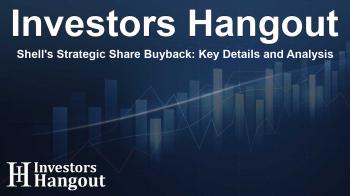Shell's Strategic Share Buyback: Key Details and Analysis

Shell's Recent Share Buyback Program Overview
Shell plc, a globally recognized leader in energy and petrochemicals, continues to demonstrate its commitment to shareholder value through its recent share buyback program. This initiative, which started in early May 2025, showcases the Company’s strategic move to optimize capital allocation while reinforcing shareholder confidence. The announcement of share purchases is a significant milestone in Shell's ongoing efforts to manage its capital structure effectively.
Details of the Share Purchases
On a noteworthy date within the program, Shell acquired a total of 562,249 shares for cancellation, seeking to enhance shareholder value and diminish the number of outstanding shares. This strategic move reflects the commitment of Shell plc (NYSE: SHEL) to return capital to its shareholders while navigating a dynamic economic landscape.
The transactions conducted on the London Stock Exchange (LSE) and through other venues, including Chi-X and BATS, were executed under the careful management of BNP PARIBAS SA, which was entrusted with making trading decisions independently of the Company.
Aggregate Information of Shares Purchased
The purchases were spread out across multiple transactions on the same date. Here are some key figures: a significant number of shares were purchased with varying prices, showing both the commitment of the Company and the market's response to such actions:
- Date of Purchase: 09/05/2025
- Total Shares Purchased: 562,249 shares
- Highest Price: £24.7750
- Lowest Price: £24.4900
- Average Price: £24.6411
Strategic Importance of the Buyback
This buyback program is not just a routine transaction; it represents a calculated effort to invest in the Company’s future while also adhering to the UK Listing Rules and Market Abuse Regulation. These share repurchases are designed to reflect Shell’s robust financial standing and long-term investment approach.
By lowering the total number of shares in circulation, Shell aims to increase earnings per share (EPS), potentially driving share prices higher and rewarding shareholders in the long run. These efforts align with Shell's broader corporate strategies aimed at transitioning to cleaner energy while efficiently managing existing business operations.
Broader Context of Share Buybacks
Share buybacks have become a popular method for companies to return value to shareholders, particularly in bullish market conditions. For investors, it can be a significant signal regarding a company’s confidence in its future prospects. Shell’s recent actions resonate with themes observed across the entire industry where capital efficient practices are prioritized.
The buyback initiative administered through BNP PARIBAS SA began on May 2, 2025, and is set to run until late July 2025. This timeline aligns with the Company’s objectives to maintain a proactive approach in managing its shares and shareholders' interests.
Regulatory Compliance and Market Movements
Shell’s approach complies with various regulations including the Chapter 9 of UK Listing Rules, as well as the EU MAR, ensuring that all actions taken are fully transparent and abide by established financial guidelines. This careful oversight is crucial given the complexities inherent to the modern financial landscape, especially with increased scrutiny on corporate governance.
Looking Towards the Future
Moving forward, Shell plc plans to continue evaluating its financial strategies, with share buybacks being a key component of its overall capital management framework. Potential investors and stakeholders are likely to look favourably upon these developments, anticipating an impactful future driven by strategic growth and enhanced shareholder engagement.
What Investors Should Consider
Investors should remain informed about Shell’s financial health and market strategies, particularly as the Company navigates transition challenges while positioning itself in the evolving energy sector. Monitoring updates regarding share performance and strategic initiatives will be essential in understanding Shell's place in the market.
Frequently Asked Questions
What is the purpose of Shell's buyback program?
Shell's buyback program aims to enhance shareholder value by reducing the number of outstanding shares, thereby potentially increasing the earnings per share.
How does the buyback affect my investment?
As shares are bought back and cancelled, the reduced share count can lead to a higher share price, which may benefit existing shareholders.
Who manages the share buyback transactions?
BNP PARIBAS SA manages the trading decisions independently on behalf of Shell during the buyback period.
When was the share buyback program announced?
The buyback program was announced in early May 2025, specifically on the 2nd.
What financial regulations does Shell adhere to during this process?
Shell adheres to Chapter 9 of the UK Listing Rules and various Market Abuse Regulations, ensuring all buyback activities are compliant and transparent.
About The Author
Contact Evelyn Baker privately here. Or send an email with ATTN: Evelyn Baker as the subject to contact@investorshangout.com.
About Investors Hangout
Investors Hangout is a leading online stock forum for financial discussion and learning, offering a wide range of free tools and resources. It draws in traders of all levels, who exchange market knowledge, investigate trading tactics, and keep an eye on industry developments in real time. Featuring financial articles, stock message boards, quotes, charts, company profiles, and live news updates. Through cooperative learning and a wealth of informational resources, it helps users from novices creating their first portfolios to experts honing their techniques. Join Investors Hangout today: https://investorshangout.com/
The content of this article is based on factual, publicly available information and does not represent legal, financial, or investment advice. Investors Hangout does not offer financial advice, and the author is not a licensed financial advisor. Consult a qualified advisor before making any financial or investment decisions based on this article. This article should not be considered advice to purchase, sell, or hold any securities or other investments. If any of the material provided here is inaccurate, please contact us for corrections.

